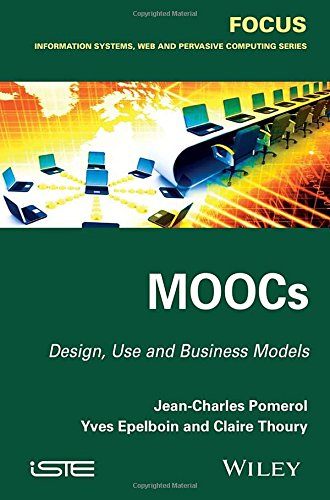

Most ebook files are in PDF format, so you can easily read them using various software such as Foxit Reader or directly on the Google Chrome browser.
Some ebook files are released by publishers in other formats such as .awz, .mobi, .epub, .fb2, etc. You may need to install specific software to read these formats on mobile/PC, such as Calibre.
Please read the tutorial at this link. https://ebooknice.com/page/post?id=faq
We offer FREE conversion to the popular formats you request; however, this may take some time. Therefore, right after payment, please email us, and we will try to provide the service as quickly as possible.
For some exceptional file formats or broken links (if any), please refrain from opening any disputes. Instead, email us first, and we will try to assist within a maximum of 6 hours.
EbookNice Team

Status:
Available4.8
41 reviews
ISBN-10 : 184821801X
ISBN-13 : 9781848218017
Author: Jean-Charles Pomerol, Yves Epelboin, Claire Thoury
MOOCs (Massive Online Open Courses) are shaking up the traditional forms of primary and continuing education and training. These new distance teaching tools which take advantage of the Web and social network revolution are making us think again about how we teach and learn.
1: What is a MOOC?
1.1. From distance learning to MOOCs
1.2. What is a MOOC?
1.3. xMOOCs, cMOOCs and other SPOCs
2: How to Construct a MOOC
2.1. From a conventional course to a MOOC
2.2. Human resources for the building of a MOOC
2.3. Steps involved in mounting a MOOC
2.4. Resources required
2.5. Post-construction tasks
2.6. Amount of human resources required for the construction of a MOOC
2.7. Cost of a MOOC
3: A MOOC for Whom and for What Purposes?
3.1. Audiences
3.2. Proper use of MOOCs
3.3. Assessment of learners and certification
3.4. Following of MOOCs and “tutored” MOOCs
4: Financing and Development of MOOCs
4.1. What benefits do MOOCs bring, and what profits can be made?
4.2. Financing of MOOCs
5: MOOCs and Higher Education
5.1. MOOCs and universities
5.2. MOOCs and lifelong learning
6: Conclusions: What Does the Future Hold for MOOCs?
6.1. “To MOOC or not to MOOC”?
6.2. Why and for whom should MOOCs be developed?
6.3. What can be done to support the development of MOOCs?
6.4. What can be done to support the users of MOOCs?
6.5. A step towards digital learning houses (DLHs)
moocs design use and business models
moocs design use and business models pdf
mooc model
a mooc is used for
a mooc is used for quizlet
Tags: MOOCs, Design, Use, Business Models, Jean Charles Pomerol, Yves Epelboin, Claire Thoury